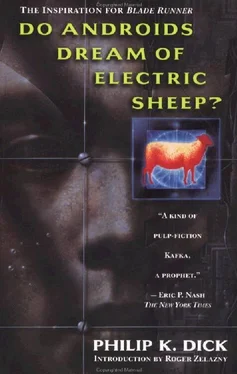“So according to Cortot,” Buster Friendly said, “there can be virtually no doubt.”
Pris had now cut three legs from the spider, which crept about miserably on the kitchen table, seeking a way out, a path to freedom. It found none.
“Quite frankly we believed Cortot,” the research chief said in his dry, pedantic voice, “and we spent a good deal of time examining publicity pictures of bit players once employed by the now defunct Hollywood movie industry.”
“And you found—”
“Listen to this,” Roy Baty said. Irmgard gazed fixedly at the TV screen and Pris had ceased her mutilation of the spider.
“We located, by means of thousands upon thousands of photographs, a very old man now, named Al Jarry, who played a number of bit parts in pre-war films. From our lab we sent a team to Jarry’s home in East Harmony, Indiana. I’ll let one of the members of that team describe what he found.” Silence, then a new voice, equally pedestrian. “The house on Lark Avenue in East Harmony is tottering and shabby and at the edge of town, where no one, except Al Jarry, still lives. Invited amiably in, and seated in the stale-smelling, moldering, kipple-filled living room, I scanned by telepathic means the blurred, debris-cluttered, and hazy mind of Al Jarry seated across from me.”
“Listen,” Roy Baty said, on the edge of his seat, poised as if to pounce.
“I found,” the technician continued, “that the old man did in actuality make a series of short fifteen minute video films, for an employer whom he never met. And, as we had theorized, the ‘rocks’ did consist of rubber-like plastic. The ‘blood’ shed was catsup, and “—the technician chuckled—the only suffering Mr. Jarry underwent was having to go an entire day without a shot of whisky.”
“Al Jarry,” Buster Friendly said, his face returning to the screen. “Well, well. An old man who even in his prime never amounted to anything which either he or ourselves could respect. Al Jarry made a repetitious and dull film, a series of them in fact, for whom he knew not—and does not to this day. It has often been said by adherents of the experience of Mercerism that Wilbur Mercer is not a human being, that he is in fact an archetypal superior entity perhaps from another star. Well, in a sense this contention has proven correct. Wilbur Mercer is not human, does not in fact exist. The world in which he climbs is a cheap, Hollywood, commonplace sound stage which vanished into kipple years ago. And who, then, has spawned this hoax on the Sol System? Think about that for a time, folks.”
“We may never know,” Irmgard murmured.
Buster Friendly said, “We may never know. Nor can we fathom the peculiar purpose behind this swindle. Yes, folks, swindle. Mercerism is a swindle! ”
“I think we know,” Roy Baty said. “It’s obvious. Mercerism came into existence—”
“But ponder this,” Buster Friendly continued. “Ask yourselves what is it that Mercerism does. Well, if we’re to be1ieve its many practitioners, the experience fuses—”
It’s that empathy that humans have,” Irmgard said “—men and women throughout the Sol System into a single entity. But an entity which is manageable by the so called telepathic voice of ‘Mercer.’ Mark that. An ambitious politically minded would-be Hitler could—”
“No, it’s that empathy,” Irmgard said vigorously. Fists clenched, she roved into the kitchen, up to Isidore. “Isn’t it a way of proving that humans can do something we can’t do? Because without the Mercer experience we just have your word that you feel this empathy business, this shared, group thing. How’s the spider?” She bent over Pris’s shoulder.
With the scissors Pris snipped off another of the spider’s legs. “Four now,” she said. She nudged the spider. “He won’t go. But he can.”
Roy Baty appeared at the doorway, inhaling deeply an expression of accomplishment on his face. “It’s done. Buster said it out loud, and nearly every human in the system heard him say it. ‘Mercerism is a swindle.’ The whole experience of empathy is a swindle.” He came over to look curiously at the spider.
“It won’t try to walk,” Irmgard said.
“I can make it walk.” Roy Baty got out a book of matches, lit a match; he held it near the spider, closer and closer, until at last it crept feebly away.
“I was right,” Irmgard said. “Didn’t I say it could walk with only four legs?” She peered up expectantly at Isidore. “What’s the matter?” Touching his arm she said, “You didn’t lose anything; we’ll pay you what that—what’s it called?—that Sidney’s catalogue says. Don’t look so grim. Isn’t that something about Mercer, what they discovered? All that research? Hey, answer.” She prodded him anxiously.
“He’s upset,” Pris said. “Because he has an empathy box. In the other room. Do you use it, J.R.?” she asked Isidore. Roy Baty said, “Of course he uses it. They—all do—or did. Maybe now they’ll start wondering.”
“I don’t think this will end the cult of Mercer,” Pris said. “But right this minute there’re a lot of unhappy human beings.“ To Isidore she said, “We’ve waited for months; we all knew it was coming, this pitch of Buster’s.” She hesitated and then said, “Well, why not. Buster is one of us.”
“An android,” Irmgard explained. “And nobody knows. No humans, I mean.”
Pris, with the scissors, cut yet another leg from the spider. All at once John Isidore pushed her away and lifted up the mutilated creature. He carried it to the sink and there he drowned it. In him his mind, his hopes, drowned, too. As swiftly as the spider.
“He’s really upset,” Irmgard said nervously. “Don’t look like that, J.R. And why don’t you say anything?” To Pris and to her husband she said, “It makes me terribly upset, him Just standing there by the sink and not speaking; he hasn’t said anything since we turned on the TV.”
“It’s not the TV,” Pris said. “It’s the spider. Isn’t it, John R. Isidore:’ He’ll get over it,” she said to Irmgard, who had gone into the other room to shut off the TV.
Regarding Isidore with easy amusement, Roy Baty said, “It’s all over now, Iz. For Mercerism, I mean.” With his nails he managed to lift the corpse of the spider from the sink. “Maybe this was the last spider,” he said. “The last living spider on Earth.” He reflected. “In that case it’s all over for spiders, too.”
“I—don’t feel well,” Isidore said. From the kitchen cupboard he got a cup; he stood holding it for an interval—he did not know exactly how long. And then he said to Roy Baty, “Is the sky behind—Mercer just painted? Not real?”
“You saw the enlargements on the TV screen,” Roy Baty said. “The brushstrokes.”
“Mercerism isn’t finished,” Isidore said. Something ailed the three androids, something terrible. The spider, he thought. Maybe it had been the last spider on Earth, as Roy Baty said. And the spider is gone; Mercer is gone; he saw the dust and the ruin of the apartment as it lay spreading out everywhere—he heard the kipple coming, the final disorder of all forms, the absence which would win out. It grew around him as he stood holding the empty ceramic cup; the cupboards of the kitchen creaked and split and he felt the floor beneath his feet give.
Reaching out, he touched the wall. His hand broke the surface; gray particles trickled and hurried down, fragments of plaster resembling the radioactive dust outside. He seated himself at the table and, like rotten, hollow tubes the legs of the chair bent; standing quickly, he set down the cup and tried to reform the chair, tried to press it back into its right shape. The chair came apart in his hands, the screws which had previously connected its several sections ripping out and hanging loose. He saw, on the table, the ceramic cup crack; webs of fine lines grew like the shadows of a vine, and then a chip dropped from the edge of the cup, exposing the rough, unglazed interior.
Читать дальше








